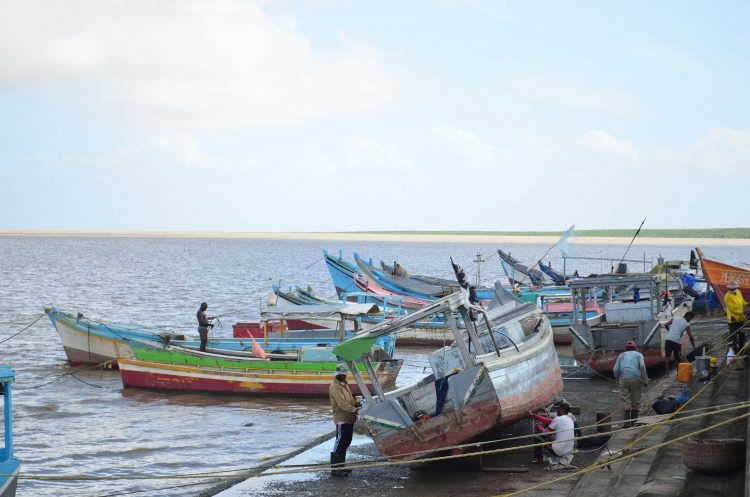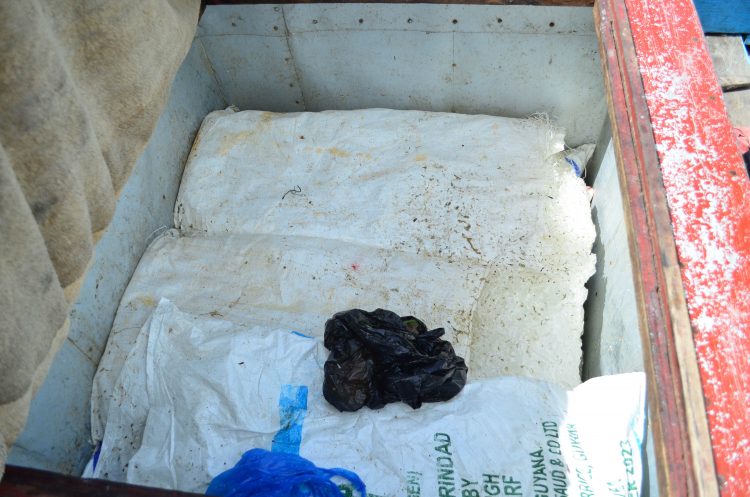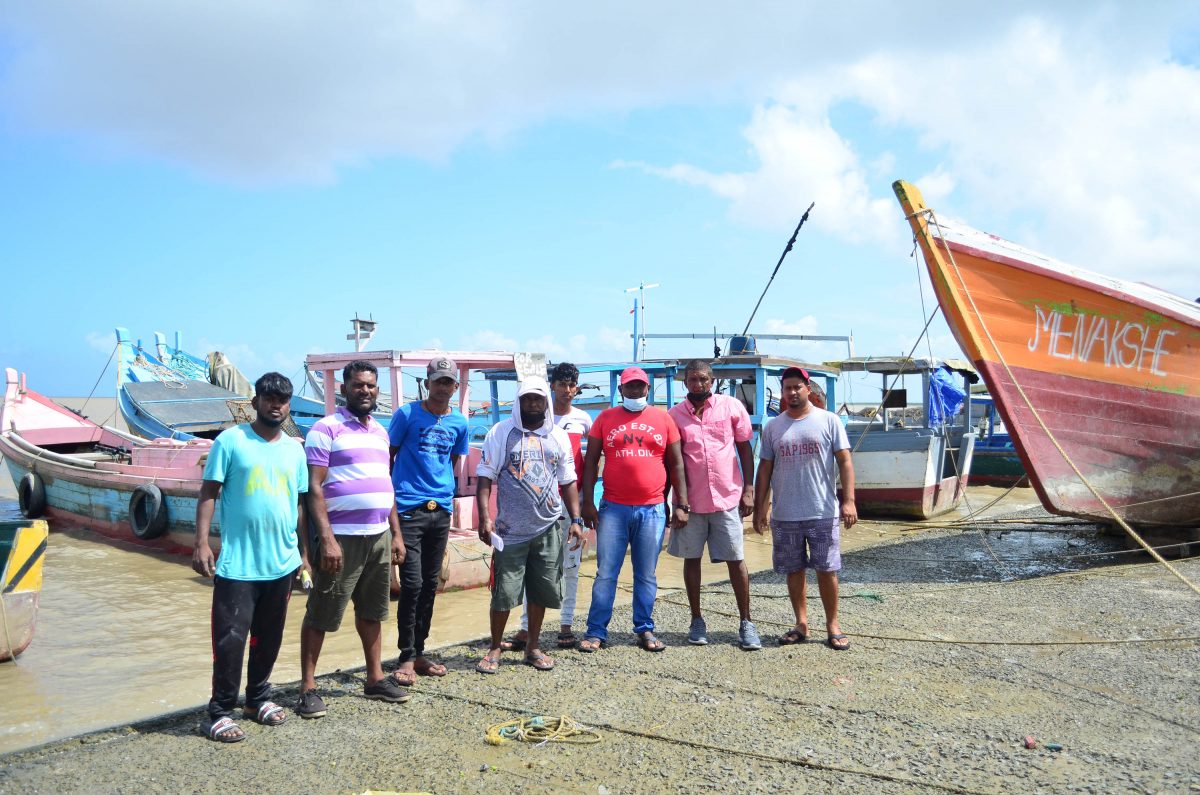The presence of oil industry vessels in areas that were once profitable fishing grounds for local fishermen has forced them to scope out new grounds resulting in extremely low catches and high overhead expenses.
At the Liliendaal foreshore on the East Coast where it would have been unusual to find boats around noon on Mondays some months ago, that is not the situation now.
The dire situation has resulted in boats moored at the foreshore with some bearing “For Sale” signs, some undergoing maintenance while the ice boxes of a few that returned on Sunday remained filled with ice due to low catches.


For the past five months fishermen who are accustomed to fishing in the area, approximately 15-17 miles away from the Liliendaal Seawall said they were instructed to move by crew members of vessels supporting ExxonMobil’s offshore operations as they were now working in the area.
“Nobody never come and tell we anything. We go out there and saw the vessels but couple well time they come and tell us to move. We go back but then they pull up next to us and using [a microphone and loudspeaker] they tell we to move,” fisherman Tony Persaud explained to Stabroek News.
In response to queries from this newspaper, ExxonMobil’s Guyana Head of Media and Communications Janelle Persaud yesterday said “We have not received such claims but I can assure you that ExxonMobil Guyana has not prohibited any fisher folk from carrying out their operations.”
She went on to explain that with the planned laying of the fibre optic cable in the coming weeks they have worked with the Ministry of Agriculture’s Fisheries Department and compensated fishermen who are likely to be affected.
“We do intend to begin the laying of fibre optic cables from our offshore facilities to onshore cable landing stations in Georgetown and Ogle in the coming weeks. The Fisheries Department identified several licensed fisher folk with pens that required removal from the approved installation route. These individuals have been compensated, the value of which was determined by several factors including information from the fisher folk themselves, Fisheries Department, market value and administrative costs”, she said in her explanation.
Yesterday was the first disclosure of such an arrangement. There had been no word of this from the Ministry of Agriculture.
According to Persaud, the only nearshore activities currently ongoing are geotechnical and geophysical surveys in support of the Gas-to-Energy project in Region Three.
Expedition
The fishermen yesterday said that with low catches in other parts of the Atlantic Ocean along the East Coast, they have ventured all the way to Berbice in a bid to find a profitable area. Their expedition however has been futile and has left them contemplating their next location. The fishermen are now considering the Pomeroon fishing belt but noted that their expenses are likely to be higher and only those who have money to invest will be able to venture that far.
The estimated investment for that trip is pegged at $175,000.
“We spend three to four days out there but we don’t come back with no big catch. We are not lying but we are feeling the pressure that’s why we are seeking some help and we called you (Stabroek News),” Feroze, one of the affected fishermen said as he highlighted their plea.
He explained that the disruption to their livelihoods has not only been affecting them but their families.
“This is all we know. I doing this work for 40 years, since I was 11 years I doing this work. I can’t read and write, fishing has been in my generation for years. If I leave this and go do look for another work they might want pay next to nothing because I can’t read or write and I never do any other work in my life,” he said.
According to Persaud, who is a boat owner and fisherman, the past months have been frustrating for everyone who is accustomed to working in the area now occupied by the oil-support vessels.
“We don’t know where to go or who to turn too. When I went to renew my licence I tell them about it. They had a meeting at Mon Repos (with a fisheries official) and we raise it with them but they said they will look at it and get back to us but nothing unto now,” Persaud lamented.
The fishermen said it has become overbearing as they are not making a profit and they are still required to meet their financial obligations.
“We spend 4-5 days out at sea but when we come back it is with one basket of fish or less and we spend more than that to go out there. When we make $9500 and we have to pay workers and expenses to cover. It is not profitable,” Persaud added. Crews range between 3-6 persons depending on the size of the boat.
Another fisherman interjected “we still owe the shop lady for the groceries we take from last week. We keep spending money we don’t have, hoping that we can get a good catch but we don’t make nothing we don’t even make enough to feed our families.”
In the area fishermen said they would mostly catch Butterfish, Bangamary, Trout and Snapper. Before they were forced to move, the fishermen said in one haul they would normally collect seven baskets of fish. From one of those trips they would make over $150,000 after selling to wholesalers.
“It is a real struggle these days. I work as a taxi driver but I get a boat to brace me. But now the money from the taxi work going into the fishing business. Every time you go you have to keep investing and you are not getting back your money. My debt is probably close to $300,000 because we just keep losing from every trip”, Rajendra Boodhoo said.
“The fishes carry prices now but we are not getting the catch. The area we normally would have a good haul they don’t want to us fishing there anymore. Bangamary selling for $340 a pound now. Last year it was $120 but we are not getting enough fish to get a good market,” he lamented.
According to him an average investment for a trip out at sea is approximately close to $50,000.
“When we go out to fish everybody benefits because we have to get a taxi to bring the workers, we buy from the local shops, we have to buy gas, and we have to buy ice so everybody benefit. When we come back we don’t sell all the fish we give to people who cannot afford so we don’t just help ourselves,” Feroze pointed out before he questioned what is happening to less fortunate families now.
Stabroek News’ efforts to solicit a comment from the Ministry of Agriculture were futile. Calls to both the Minister of Agriculture Zulfikar Mustapha and Chief Fisheries Officer Denzel Roberts went unanswered.
In recent months fishermen up and down the coast have complained about low catches and questions have been asked about what studies the Ministry of Agriculture and ExxonMobil have been doing to determine the cause.






